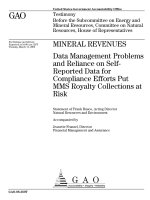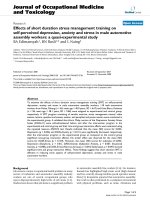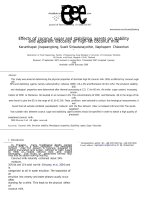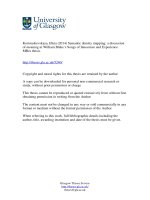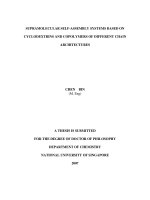William blake on self and soul
Bạn đang xem bản rút gọn của tài liệu. Xem và tải ngay bản đầy đủ của tài liệu tại đây (572.55 KB, 216 trang )
William Blake on Self and Soul
William Blake
on Self and Soul
L au r a Q u i n n e y
h a r va r d u n i v e r s i t y p r e s s
Cambridge, Massachusetts, and London, England 2009
Copyright © 2009 by the President and Fellows of Harvard College
all r ight s reserv ed
Printed in the United States of America
Library of Congress Cataloging-in-Publication Data
Quinney, Laura.
William Blake on self and soul / Laura Quinney.
p. cm.
Includes bibliographical references and index.
ISBN 978-0-674-03524-9
1. Blake, William, 1757–1827—Knowledge—Psychology. 2. Self in literature.
3. Identity (Psychology) in literature. 4. Subjectivity in literature. I. Title.
PR4148.P8Q85 2009
821'.7—dc22
2009011507
For Billy, Daniel, and Julian
The axis of reality runs through the egotistic places.
—William James, The Varieties of Religious Experience
For a Tear is an Intellectual thing.
—William Blake, Jerusalem
Contents
Preface
xi
Acknowledgments
xv
A Note on Citation
xvii
Introduction: The Impossible Self
1
1. Empiricism and Despair
27
2. Wordsworth, Plato, and Blake
66
3. The Four Zoas: Transcendental Remorse
90
4. Milton: The Guarded Gates
125
5. Jerusalem: The Will to Solitude
155
Notes
179
Bibliography
183
Index
189
Preface
It has always been clear that William Blake was both a political radical and
a radical psychologist. The most illuminating interpretations of Blake—by
Northrop Frye, Harold Bloom, Brian Wilkie, and Mary Lynn Johnson, to
name a few—emphasize his subtlety and innovation in the understanding
of human psychology. This book addresses what Blake said about a specific
aspect of psychology—a reflexive aspect, deeper and stranger in itself than
thought and feeling—the subject’s experience of its own interiority. What is
the self ’s relation to itself ? Blake thought that under certain conditions, it was
bound to be anxious and lonely. That is, he thought that if the self is identified with the main consciousness or “I,” especially the “I” as a center of rationality, it will feel solitary and insecure. The greater its insecurity, the more
it tries to swell into a false but mighty “Selfhood.” And the larger the Selfhood
bulks, the lonelier it grows. As Peter Otto rightly characterizes it, “Fallen existence is a world in which one isolated self is pitted against another” (19). But
why is that so? How does the illusion of Selfhood arise? What damage does it
do? Why does the subject cling to it? How can one break its hold? This fundamental inquiry spurs Blake’s development and leads him to some of his most
original thinking.
In this book I attempt to show that Blake’s psychology of subjectivity is
astute, innovative, and complex, to demonstrate that it was a pivotal inquiry
he pursued and evolved over the whole course of his writing career, and to
[ xi ]
p r e f a c e
suggest that he was prompted in part by self-examination, analyzing and
endeavoring to overcome his own loneliness and despair. In his study of
the self ’s struggle with itself lies the deeper motive of Blake’s polemic
against the thinking of his contemporaries, namely, empiricism, the philosophy of the Enlightenment and the New Science. Blake’s hostility to these
movements represents not merely a poet’s defense of “Imagination” and “Vision” but also a penetrating psychological critique: Blake sees these ideas as
affecting the subject’s self-description. They promote passivity and despair by
belittling the subject, and exacerbate the subject’s self-division by denying its
immortal longings. In Blake’s epic psychomachia The Four Zoas, he has one of
his characters voice the anguished self-confusion of Lockean man: “I am like
an atom/A Nothing left in darkness yet I am an identity.” This character,
Tharmas, understands that as a merely natural being, he is merely a node of
solitary consciousness, yet from within the intuition presses on him that he is
something grander and more significant, a special being, an “identity.” The
demystifying science of empiricism deepens the self ’s incoherence to itself.
Blake responds by formulating a therapy for the bewilderment of the self.
But as he goes on he perceives greater and greater obstacles—in its very
nature—to the remaking of subjectivity.
Blake believed one could behold the traumatic nature of empiricist
selfhood in the earlier poems of William Wordsworth. The uneasy self of
Wordsworth’s poetry exemplifies the sorrows of Natural Man. Blake and
Wordsworth had emerged out of an intellectual culture dominated by John
Locke, but whereas Blake reacted by rejecting received opinion, Wordsworth
molded empiricism to his own ends. In Wordsworth’s poetry of the 1790s,
he adapted the terms of empiricism creatively in order to elaborate his intuitions about the hauntedness of the interior life. Later, Wordsworth borrowed
an antithetical model of the mind from Plato and Immanuel Kant without
ever giving up his sense that the interior is divided and self-puzzling.
Wordsworth’s legacy shows what Blake was up against. In the high Romantic
tradition, Wordsworth, with his theme of the atomic self and its depressive
anxieties, prevailed: Samuel Taylor Coleridge, in essence, shared Wordsworth’s views and the younger Romantics take after them. The troubled
lyric “I” of Romantic and post-Romantic poetry owes a great deal to the empiricist representation of the self—or so Blake would argue. He wrote an
incisive critique of this tradition before it got fully underway.
[ xii ]
p r e f a c e
In his effort to counter baleful empiricist notions, Blake became interested in the alternative offered by Platonic transcendentalism, particularly
as it metamorphosed into the heterodox religions of Gnosticism and Neoplatonism. Both characterize the soul as an “acosmic” entity, not belonging
to this world, but having a true home in a transcendental realm. The transcendental realm is anonymous or unknowable, yet it is present in the innermost soul, here and now. These ancient religious philosophies accept the
soul’s loneliness but offer remedies, and their remedies do not depend, as orthodox Christianity does, on subjecting the soul to an ambiguous anthropomorphized God, with his system of deferred rewards and punishments. This
approach appeals to Blake who collapses all spiritual hierarchy, finding godliness in the “Great Humanity Devine,” in which the soul participates and by
which it gains access to “the Eternal Now.” Blake has faults to find with both
Neoplatonism and Gnosticism (and he tends to ignore their differences), but
he approves of their argument that the cure for the soul’s loneliness is to be
found within itself—in the recognition and assertion of its transcendental
provenance, that is to say, its integrity and freedom, and its share in Eternity.
Of course Blake is not content to reprise another man’s system. He
probes all of these philosophies and subjects them to an original psychological analysis. Many books and articles have been written about Blake’s use of
Gnosticism and Neoplatonism. Some have focused on showing a straightforward pattern of influence and have, therefore, limited themselves to tracing
out what they present as Blake’s more or less wholesale “borrowings” from
earlier tradition. This is particularly true of pioneering works such as those
of Kathleen Raine and George Mills Harper, written in the middle of the
twentieth century. Only a handful of more recent works on Blake and Gnosticism have taken a similar tack (e.g., Peter J. Sorenson). Other studies touch
in passing on Blake’s relationship with Gnosticism or Neoplatonism, often
noting that he has adapted rather than simply borrowed from these sources
(e.g., Mary Hall, Morton D. Paley, and Thomas Altizer). I seek to investigate
why Blake was interested in such ideas to begin with, and why he felt compelled to revise them. In every case, it is the representation of subjectivity to
which he is alert. Blake analyzes the psychology implicit in the philosophical
doctrine and evaluates it, perceiving that under the names of empiricism and
Platonism, Gnosticism and Neoplatonism, certain experiences of selfhood
have been codified, and that those codes have a self-ratifying effect. Eventually
[ xiii ]
p r e f a c e
Blake tries out his own therapeutic formulations. This project draws him into
deeper and deeper, more and more detailed study of the psychology of what
he calls “Natural Man,” or, as I shall term it, “the empiricist subject.” Yet none
of Blake’s solutions is as plain as his decisive rhetoric might lead us to suppose.
Over time, he perceived ever larger obstacles to the psychological salvation he
was at work devising.
The book discusses Blake’s works in chronological order in order to follow
the growth of his ideas about subjectivity. Chapters 1 and 2 explore Blake’s
basic paradigm, beginning with a general introduction to his critique of empiricism, focusing on the study of his major long poems of the 1780s and 1790s,
then offering a contrast of his views with those of Wordsworth. Chapters
3, 4, and 5 take up the epic prophecies, the poems in which Blake is vitally
amplifying and transforming his first ideas. For Blake seems to have inquired
into the experience of interiority most intently during the time when he was
writing the Urizen books Milton and The Four Zoas. It was a decade of rapid
and exciting discovery. I strive to capture the momentum of Blake’s unfolding
speculation.
My argument treats as synonymous a number of terms that are distinguished within and between different disciplines: ego, self, inner life, phenomenal self, empirical self, central consciousness. Blake did not use any of these
terms nor do the words that he did use overlap with these exactly. Yet one
must employ them in order to translate his ideas out of his idiosyncratic vocabulary. I use the word that seems best to render his meaning in a given context. This book is sympathetically and passionately written, not because
I share all of Blake’s ideas, but because I think that their forcefulness is part
of their meaning, and to convey their meaning I had to muster as much of
their force as I could.
[ xiv ]
Acknowledgments
It took a long time to write this book. Along the way many people gave me
help and encouragement for which I gladly thank them here: Harold Bloom,
Thomas Brennan, Marshall Brown, John Burt, Stanley Cavell, Lorna Clymer,
Leopold Damrosch, Erin Erhart, Frances Ferguson, Melissa Franklin, Paul Fry,
Marilyn Gaull, Hannah Ginsborg, Deborah Gordon, Dr. Stacey Gore, Moshe
Halbertal, Nicholas Halpern, Geoffrey Hartman, Neil Hertz, Ann Hochschild,
Emily Bernard Jackson, Yoon Lee, Robin Miller, Jeff Nunokawa, Leah Price,
Christopher Pye, Marc Redfield, Thomas Reinert, James Schwartz, Paul Solman, Karen Swann, and Daniel Warren. I am grateful for all their kindness
to my parents-in-law, Alma and Stephen Flesch, and to my father, Richard,
and my sister, Anne. Those who endured the most while I was writing the
manuscript are my husband and sons, to whom the book is dedicated.
The earliest writing I did for this project was published as “Escape from
Repetition: Blake versus Locke and Wordsworth,” in Ritual, Routine, and
Regime: Repetition in Early Modern British and European Cultures (Toronto: Univ.
of Toronto Press, 2006). A portion of my chapter on “Wordsworth, Plato, and
Blake” appeared originally under the title “Wordsworth’s Ghosts and the Model
of the Mind,” in European Romantic Review, 9:2 (Spring 1998), 293-300. Another
portion appeared as “Swerving Neoplatonists” in The Wordsworth Circle 37:1
(Winter 2006), 31-38. That portion is published here in a revised form. I thank
both journals for permission to reprint material from my articles.
[ xv ]
A Note on Citation
All citations of Blake’s poetry refer to The Complete Poetry and Prose of William
Blake, 2nd edition, edited by David Erdman, with commentary by Harold
Bloom (Berkeley: Univ. of California Press, 1982). Citations are provided in
parentheses after the quotation. Short poems, annotations, and prose are
cited by page number in the Erdman edition, abbreviated as “E.” Poems with
plates are cited by plate and line number, followed by the Erdman page number. Quotations from The Four Zoas, which has pages instead of plates, are
cited by page and line number. Blake’s titles are abbreviated as follows:
Amer
BA
BL
BU
Eur
FZ
J
M
MHH
Thel
Tir
TNNR b
VDA
America
The Book of Ahania
The Book of Los
The [First] Book of Urizen
Europe
The Four Zoas
Jerusalem
Milton
The Marriage of Heaven and Hell
The Book of Thel
Tiriel
“There Is No Natural Religion b”
Visions of the Daughters of Albion
[ xvii ]
William Blake on Self and Soul
Introduction:
The Impossible Self
In one sense the self is thriving. Magisterial works such as
Charles Taylor’s The Sources of the Self and Jerrold Siegel’s The Idea of the Self,
as well as the plethora of other recent titles on the self testify to the current
fascination of the topic. Yet it is a widespread assumption among contemporary philosophers and literary theorists that the concept of “the self ” is obsolete. At the end of their recent book, The Rise and Fall of Self and Soul, Raymond
Martin and John Barresi conclude that the notion of the self as a “unified
entity” has been permanently debunked by modern science and philosophy:
“Analysis has been the self ’s undoing. As a fragmented, explained, and illusory phenomenon, the self [can] no longer retain its elevated status. And it is
hard to see how it might ever again regain that status. It is as if all of Western
civilization has been on a prolonged ego trip that reality has finally forced it to
abandon” (304–5).
Seventeenth- and eighteenth-century science did away with the concept
of the “soul,” and the eighteenth century replaced it with the concept of “self,”
but the march of progress liquidated that notion too, along with the related
idea of the universal “subject.” Thus much contemporary thought dismisses
the discourses of soul, self, and subject as anachronisms. This common view
[ 1 ]
i n t r o d u c t i o n
is, I believe, malformed because it entails dismissing the actual experience of
subjectivity, that is, the subject’s experience of itself as a subject. The self supposed to be obsolete is the unitary subject, the integral, transcendent self
linked to the traditional religious idea of the immortal soul. I state categorically that the actual subject has never mistaken itself for a Subject of this
kind. Modern skeptical thought congratulates itself for a work of demystification that the subject by virtue of its subjectivity performs every day.
Martin and Barresi concede that this “ego trip” is likely to go on despite
our putative enlightenment: the idea of a unified self is not dispensable because many everyday practices depend on it. More deeply, the individual
has an intuition of selfhood so strong that it cannot be summarily dispelled:
“each of us seems to have a kind of direct, experiential access to him- or herself [a Cartesian intuition] that makes the development of theories of the self
and personal identity, however interesting, seem somewhat beside the point”
(302). The intuition of selfhood is tenacious; it rides roughshod over the rational truth. As is often the case, we are enlightened in theory but benighted
in practice: “For many central and persistent purposes of everyday life, theory and practice are likely to remain autonomous, at least when it comes to
theories of the self ” (303). But does the everyday self really live with itself so
naively and happily? Here Martin and Barresi make a mistake characteristic
of those who treat the concepts of self and soul in the abstract: they fail to
inquire further into the self ’s own relationship to the idea of selfhood. For
whereas the intuition of selfhood persists within the self, it also is already
embattled within the self.
If the intuition of selfhood attends Western subjectivity, then so does its
frustration. Subject-life entails interior struggle and disappointment because
the actual “self ” fails to coincide with its own self-definition. Even to speak of
“the self ” or “subject” here is a misnomer: we must say that an elusive and
as-yet-ununified “self ” feels an imperative to find in itself a “Self ” worthy of
the name and that the imperative never desists, although such a Self cannot
be found. The self does not possess its intuition of selfhood in comfort—it
does not fall back on a reassuring confidence in its integrity, but rather seeks
for such confidence in vain; it seeks wholeness, but encounters self-division
and self-doubt. Disillusionment with “the self ” that contemporary thinkers
attribute to modernity actually defines the experience of selfhood. When
Jacques Lacan deconstructs the Cartesian cogito and demonstrates that “I” is
[ 2 ]
i n t r o d u c t i o n
not self-coincident, he may scandalize the theorist, but the subject is likely
to assent because Lacan’s claim captures the felt insecurity of selfhood. The
“error” of René Descartes’s philosophical idealism cannot be sustained, Lacan says, for “There is no subject without, somewhere, aphanisis [fading, disappearance] of the subject, and it is in this alienation, in this fundamental
division, that the dialectic of the subject is established” (221). The rhetorical
power of Lacan’s argument lies in its appeal to the experience of subjectivity.
Whatever the ontological truth of the matter, to be a subject is to feel that
such a description of subjectivity is true. The language of “self ” and “subject”
may have been rendered atavistic, but the concepts can never lose their hold
on the individual subject, because subjectivity is constituted in its balked
relation to them.
In fact, the intuition of selfhood has always been perplexed in theory as
well as in practice. Western philosophy and literature have borne witness
since the time of Greek mythology to the fragmentation of the self. This sense
of fragmentation has given rise to the many fascinating paradigms of selfdivision: everything from Plato’s tripartite division of the soul to Gnosticism’s evocation of the “incrusted” transcendental spirit, Augustine’s description of the “darkness hidden within” him, Descartes’s dualism, and Kant’s
faculty psychology, to Sigmund Freud’s map of the psyche and Melanie Klein’s
kaleidoscopic “inner chaos.” Radically dissimilar as these paradigms of selfdivision and their provenances are, they all emphasize the confusion of the
self in relation to its own selfhood. They begin by treating the self ’s embattled experience of itself as a central fact that cries out for explanation. And
the fact is sufficiently central that its explanation opens a window on expansive metaphysical views. It becomes the pivot of far-reaching claims. The
self ’s experience of itself as fragmented testifies to larger truths about human
nature and sometimes divine nature and the nature of reality. Each theory offers up this feature of subjective experience as a validation of particular ontological truths. Why must reason struggle with emotion and appetite? Because
reason is the highest faculty of the soul; it is confirmation of the soul’s origin
in the intelligible world. Why is the transcendental soul benighted in the
world? Because it fell from heaven, and was waylaid here by an evil god. Why
is there darkness hidden within? Because of the human soul’s inherent perversity. Why is the ego beleaguered? It is menaced by insubordinate repressed
energies.
[ 3 ]
i n t r o d u c t i o n
The beauty of these claims is that evidence of their truth becomes available to everyone through the simplest act of introspection. Common experience of selfhood is the proof, as Socrates shows in the Phaedo when he disputes
the definition of the soul as a “harmony.” The soul is a harmony neither in our
experience of the inner life nor in the literary representation of it. (The tripartite division of the soul appears in the Phaedrus; in this passage, “soul” is a unitary faculty but selfhood is divided.)
We previously agreed that if the soul were a harmony, it would
never be out of tune with the stress and relaxation and the striking of the strings or anything else done to its composing elements,
but that it would follow and never direct them?
We did so agree, of course.
Well, does it now appear to do quite the opposite, ruling over
all the elements of which one says it is composed, opposing
nearly all of them throughout life, directing all their ways, inflicting harsh and painful punishments on them, at times in physical
culture and medicine, at other times more gently by threats and
exhortations, holding converse with desires and passions and
fears as if it were one thing talking to a different one, as Homer
wrote somewhere in the Odyssey where he says that Odysseus
“struck his breast and rebuked his heart saying, ‘Endure, my
heart, you have endured worse than this.’ ”
(94 c–d, Complete Works 82)
The soul must discipline the wayward passions and appetites, and the result is frequent internal conflict. This internal conflict, a basic fact of psychological experience, is offered as evidence for the soul’s sovereignty and then,
in a leap, of its divinity and immortality. Strikingly, it is not the soul’s conviction of its own transcendence but rather the persistence and strength of inner
conflict that proves it is transcendent. The self ’s fraught experience of itself
testifies to major metaphysical realities. It is a surety that, like Platonic recollection, lies in every heart as intimate and indubitable truth.
From the point of view of science, the authoritative discourse of our own
time, the self ’s experience of itself has lost its hold on truth-value. Since the
eighteenth century, the evidentiary value of introspection has come under
[ 4 ]
